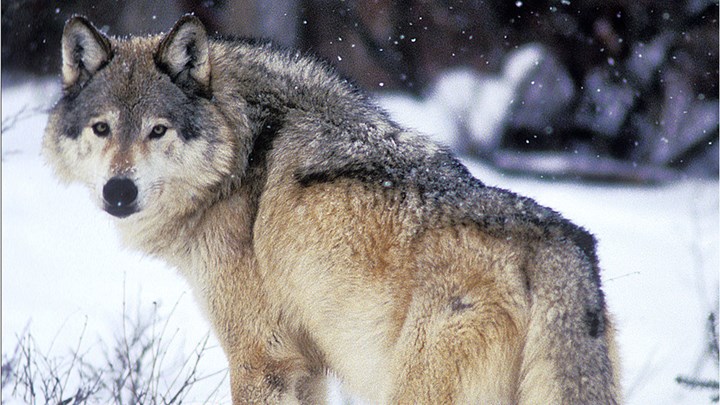
by Mark Chesnut - Monday, December 4, 2023

Wildlife officials in Michigan are considering opening a season for gray wolves, and those on both sides of the issue have a lot to say about the possibility.
Because Great Lakes and Pacific Northwest states continued to document thriving wolf populations, the gray wolf was officially removed from the endangered species list in the Lower 48 states by the U.S. Fish & Wildlife Service back in 2020 under the Trump administration. At the time, Secretary of the Interior David Bernhardt said the species no longer met the criteria in the Endangered Species Act (ESA).
“After more than 45 years as a listed species, the gray wolf has exceeded all conservation goals for recovery,” Bernhardt said. “Today’s announcement simply reflects the determination that this species is neither a threatened nor endangered species based on the specific factors Congress has laid out in the law.”
With growing and sustainable populations, the gray wolf delisting was not only appropriate, but is a testament to the significant and successful conservation efforts of federal and state wildlife agencies to increase wolf numbers. Hunters across the country benefit from the delisting as state-specific management of these top predators enhances overall conservation efforts and allows hunters to play a more active role in wildlife management.
However, after a series of legal challenges a federal judge in 2022 re-established protection of the species, despite objections from many hunting and conservation groups who believe states should determine management of their wildlife resources.
The possible Michigan wolf hunting season currently under consideration by the state’s Natural Resources Commission (NRC) would occur only if the species were to again be delisted. There are an estimated 600 to 700 wolves in Michigan’s Upper Peninsula, and numbers have remained steady for the past decade.
Many in favor of a wolf hunting season in the Wolverine State simply want the species to be managed by state wildlife officials, not the federal government. Other proponents point to burgeoning populations wreaking havoc on deer populations and killing livestock, as well as killing hunting dogs and other pets, which state officials confirm is “on the uptick.”
If a wolf hunting season is established in Michigan, it won’t be anything new to old-timers. From 1817 to 1960, the state paid bounties to hunters for killing wolves and even maintained a trapper system to control the population.
It’s interesting to note that wolf hunting has been on the ballot in Michigan in the last decade. In the 2014 general election, Michigan voters rejected two referendums on hunting and trapping wolves. One proposal would have established a harvest season on wolves, while the other would have granted the NRC the authority to designate wolves and other animals as game species.
Earlier this year, U.S. Rep. Lauren Boebert (R-Colo.) introduced a measure to remove recovered gray wolves from ESA protections. The measure was approved by the House Committee on Natural Resources but stalled afterward.
At the time, Rep. Boebert stated: “The science is clear, the gray wolf is fully recovered, and it is time for the federal government to get out of the way and allow state and tribal wildlife agencies to manage this species.”
As hunters are aware, the National Rifle Association has been involved in the wolf debate for nearly two decades, standing with hunters and supporting wildlife science and legal, regulated hunting as a wildlife management tool. In fact, the NRA and Safari Club International regularly remain in the news over lawsuits regarding gray wolf delisting.
About the Author
Freelance writer and editor Mark Chesnut is the owner/editorial director at Red Setter Communications LLC in Jenks, Okla. An avid hunter, shooter and bird dog field-trialer, he has been covering Second Amendment issues and politics on a near-daily basis for almost 25 years.
E-mail your comments/questions about this site to:
[email protected]
